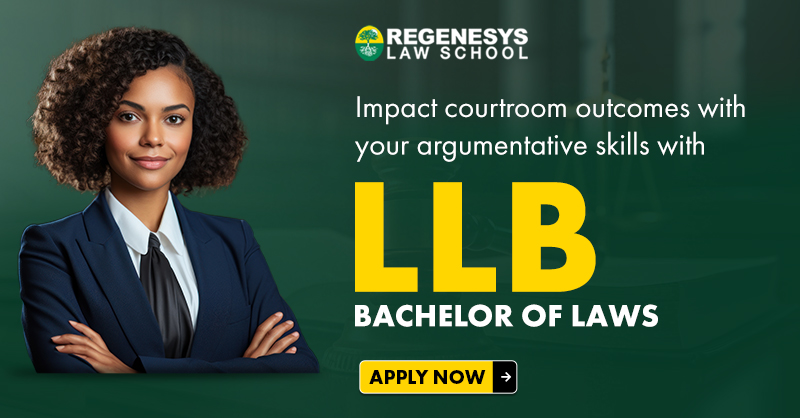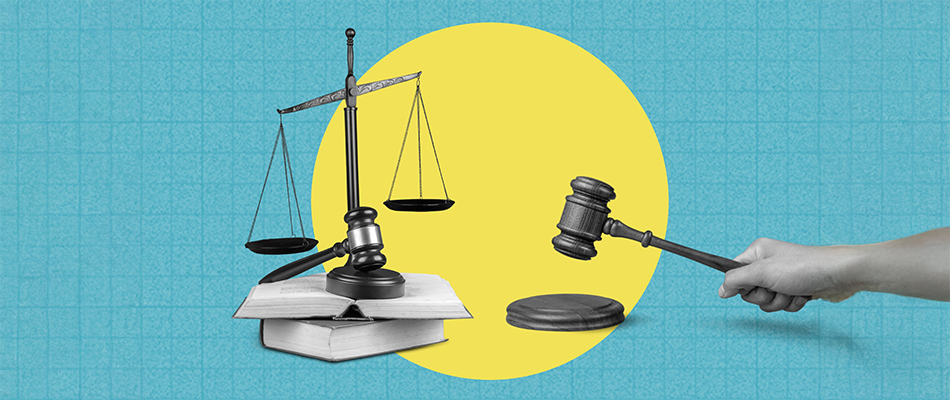The LLB degree (Bachelor of Laws) is the foundational qualification for aspiring legal professionals in South Africa and beyond. It provides students with a strong grounding in legal principles, ethics, and analytical thinking, preparing them for a wide range of career paths. However, while the LLB is sufficient to begin a legal career, higher-level roles, such as senior advocates, judges, or specialists, often require additional qualifications, professional training, and ongoing learning.
This article includes the Regenesys LLB programme, its admission requirements, curriculum, career opportunities, and whether the LLB alone is sufficient to practise law.
Table of Contents

Also read, LLB vs LLM: Understanding Legal Degrees
How an LLB Prepares You for a Legal Career
An LLB degree provides more than just theoretical knowledge; it equips students with the core skills and competencies required to succeed in the legal profession.
Key aspects include:
- Critical thinking and problem-solving: Ability to interpret laws and apply them to complex situations.
- Legal research and writing skills: Drafting documents, case analysis, and effective communication.
- Ethical and professional practice: Developing responsibility, integrity, and decision-making aligned with legal standards.
- Exposure to Global Legal Principles: Understanding South African Law in a Broader International Context.
By the end of the degree, graduates are well-prepared to navigate real-world legal challenges and pursue further professional admission or specialisation.
Also read, Why is Legal Research Important in Bachelor of Laws (LLB)?
Path to Becoming a Practising Lawyer
Becoming a practising lawyer is a structured process that goes beyond obtaining an LLB degree. While the degree provides the essential legal knowledge and critical thinking skills, aspiring lawyers must complete a series of professional steps to gain practical experience, demonstrate competence, and receive official licensure.
Key steps to practising Law:
- Practical training: – Enrol in articles of clerkship for attorneys or pupillage for advocates. This stage provides hands-on training under the supervision of experienced legal professionals, allowing graduates to apply theoretical knowledge, handle cases, draft documents, and develop courtroom skills.
- Professional exams: – Pass the competency-based examinations or bar exams set by the relevant legal authorities in your jurisdiction. These exams assess both theoretical understanding and practical abilities, ensuring that aspiring lawyers meet professional standards.
- Admission to the High Court: – After completing practical training and passing the necessary exams, graduates can apply to the High Court for formal admission as qualified legal practitioners. This step officially licenses them to practise law independently.
By following these steps, law graduates acquire the experience, skills, and recognition necessary to establish a successful legal career and confidently serve clients in a professional capacity. To learn more about practising law, explore the Regenesys LLB programme.
Also read, Top 5 Reasons to Study LLB and Build a Successful Legal Career
Regenesys Programme Overview (LLB)
The Regenesys Bachelor of Laws is a comprehensive, four-year programme designed to prepare students for the complexities of modern law. It balances theoretical study with practical learning, ensuring that graduates not only know the law but also understand how to apply it effectively.
Key highlights of the programme:
- Intake: February, March, July, and October
- Duration: 4 Years (Full-time study)
- Credits: 485
- NQF Level: 8 (an advanced undergraduate qualification)
- SAQA ID: 119076
- Study Mode: Available in both Online and Contact learning
Through its innovative teaching approach, Regenesys helps students grow as professionals and individuals, instilling confidence to work in both courtrooms and corporate boardrooms.
Admission requirements:
To ensure students are academically prepared, Regenesys has precise admission requirements for the LLB programme. These standards align with SAQA regulations and the expectations of the legal profession.
- Matric with a Bachelor’s pass or NQF Level 4 equivalent qualification.
- English Proficiency:
- First Language: Minimum 50%
- Second Language: Minimum 60%
- International Students (Africa): Higher-level pass (26 APS).
- Strong competence in Mathematics, English, and communication skills.
- Basic computer literacy and access to reliable internet and IT resources.
This ensures that learners from diverse backgrounds have the opportunity to begin their law journey at a time that best suits them.

Also read, LLB Career Advantages: Benefits of Holding an LLB Degree
LLB Curriculum at Regenesys
The curriculum is carefully designed to provide graduates with a holistic legal education. It not only covers South African law but also offers insights into global legal systems, making the degree versatile and relevant for future career opportunities.
Core modules:
- Computer Literacy: equipping students with digital skills necessary for legal research and practice.
- Family Law: exploring legal issues around marriage, divorce, custody, and inheritance.
- Law of Persons: focusing on individual rights, duties, and the legal capacity of persons.
- Legal English: strengthening legal writing, drafting, and interpretation skills.
- Pillars of South African Law: covering constitutional law, criminal law, and administrative law.
- Foundational Personal Mastery: encouraging leadership, ethics, and self-awareness for personal and professional growth.
Students also engage in case studies, mock trials, and practical assignments, ensuring they learn to think like lawyers, not just memorise laws.
Read the article, Top Strategies for Successfully Balancing LLB and a Job in South Africa
Career Paths After an LLB
Graduates of LLB can pursue diverse and rewarding career paths, both within and beyond traditional legal roles. While the degree alone can open many exciting opportunities, pursuing higher education can enhance career prospects and provide access to more specialised roles in the field.
The career paths after an LLB degree are as follows:
- Assistant Prosecution Officer: Supports prosecutors in preparing and presenting cases, conducting legal research, and managing documentation for criminal proceedings.
- Government Services: Opportunities in local, provincial, or national government departments, handling legal matters, policy implementation, and regulatory compliance.
- Judicial Services: Positions such as court clerks, judicial assistants, or roles assisting judges in legal research, drafting judgments, and case management.
- Law Professor or Teacher: Teaching law at universities, colleges, or specialised institutions, contributing to legal education and mentoring future lawyers.
- Legal Adviser: Providing legal counsel to corporations, NGOs, government bodies, or private clients, ensuring compliance with laws and regulations.
- Legal Assistant: Supporting lawyers in law firms or corporate legal departments by conducting research, preparing legal documents, and managing client communications.
- Legal Journalist: Reporting on legal developments, court cases, and policy changes for media organisations, helping the public understand the law.
- Legal Researcher: Conducting in-depth research for law firms, academics, NGOs, or government agencies to support case strategies, policy development, or publications.
- Litigation: Representing clients in court, preparing cases, and advocating on behalf of individuals, businesses, or organisations.
- Public Prosecutor: Representing the state in criminal cases, presenting evidence, and ensuring justice is served while upholding legal ethics.
These career paths demonstrate the versatility of an LLB degree, allowing graduates to work in courts, corporate offices, government institutions, academia, and even media or research sectors. With the proper practical training, professional development, and experience, LLB graduates can build fulfilling and impactful careers across multiple domains.
Also read, LLB: The Importance of Legal Training in Society
Conclusion
The LLB degree is a prestigious qualification that opens doors to the legal profession. At Regenesys, the LLB is more than just theory; it blends academic excellence with practical exposure and personal mastery. Graduates leave prepared for diverse career paths, whether in courtrooms, corporations, or public service.
However, while the LLB is sufficient to begin your legal journey, advancing into leadership roles requires more: practical training, admission exams, and ongoing professional development. In short, the LLB is the foundation, but your growth as a lawyer depends on the steps you take after graduation.
Apply now with Regenesys Education and begin your LLB journey today.

LLB Degree Enough to Become a Lawyer – FAQ
Students require a Matric with a Bachelor’s pass (or equivalent), proficiency in English, and basic computer skills. International students require a higher-level pass with a minimum of 26 APS.
It is a four-year undergraduate programme comprising 485 credits.
Yes. Regenesys offers both online and contact study modes to suit students’ needs.
Careers include attorney, advocate, legal advisor, corporate lawyer, prosecutor, or academic.
While not mandatory, pursuing an LLM or specialised training enhances career prospects and prepares you for higher roles.







